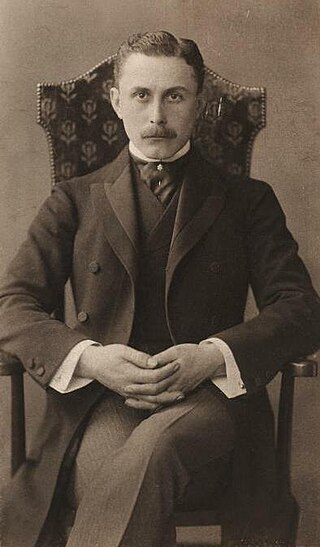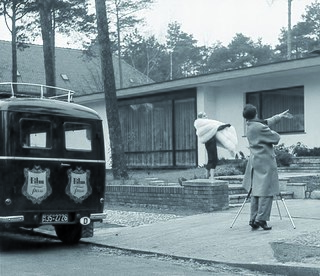
Eva Gronbach (born 1971, in Cologne, West Germany) is a German fashion designer. [1]

Eva Gronbach (born 1971, in Cologne, West Germany) is a German fashion designer. [1]
Fashion is a form of self-expression with a specific context, such as time, place and purpose. Example of these are clothing, footwear, lifestyle, accessories, makeup, hairstyle, and body posture. The term implies a look defined by the fashion industry as that which is trending. Everything that is considered fashion is available and popularized by the fashion system.

Adolf Franz Karl Viktor Maria Loos was an Austrian and Czechoslovak architect, influential European theorist, and a polemicist of modern architecture. He was inspired by modernism and a widely-known critic of the Art Nouveau movement. His controversial views and literary contributions sparked the establishment of the Vienna Secession movement and postmodernism.

Retro style is imitative or consciously derivative of lifestyles, trends, or art forms from history, including in music, modes, fashions, or attitudes. In popular culture, the "nostalgia cycle" is typically for the two decades that begin 20–30 years ago.
Dark wave is a music genre that emerged from the new wave and post-punk movement of the late 1970s. Dark wave compositions are largely based on minor key tonality and introspective lyrics and have been perceived as being dark, romantic and bleak, with an undertone of sorrow. The genre embraces a range of styles including cold wave, ethereal wave, gothic rock, neoclassical dark wave and neofolk.

In German culture, Ostalgie is nostalgia for aspects of life in Communist East Germany. It is a portmanteau of the German words Ost (east) and Nostalgie (nostalgia). Its anglicised equivalent, ostalgia, is also sometimes used. Another term for the phenomenon is GDR nostalgia

A dirndl is a feminine dress which originated in German-speaking areas of the Alps. It is traditionally worn by women and girls in Austria, Bavaria, Liechtenstein, Switzerland and Alpine regions of Italy. A dirndl consists of a close-fitting bodice featuring a low neckline, a blouse worn under the bodice, a wide high-waisted skirt and an apron.

Youth subculture is a youth-based subculture with distinct styles, behaviors, and interests. Youth subcultures offer participants an identity outside of that ascribed by social institutions such as family, work, home and school. Youth subcultures that show a systematic hostility to the dominant culture are sometimes described as countercultures.

A fashion capital is a city with major influence on the international fashion scene, from history, heritage, designers, trends, and styles, to manufacturing innovation and retailing of fashion products, including events such as fashion weeks, fashion council awards, and trade fairs that together, generate significant economic output.

Outside Western cultures, men's clothing commonly includes skirts and skirt-like garments; however, in the Americas and much of Europe, skirts are usually seen as feminine clothing and socially stigmatized for men and boys to wear, despite having done so for centuries. While there are exceptions, most notably the cassock and the kilt, these are not really considered 'skirts' in the typical sense of fashion wear; rather they are worn as cultural and vocational garments. People have variously attempted to promote the fashionable wearing of skirts by men in Western culture and to do away with this gender distinction.
Makino Tadakiyo was a Japanese daimyō of the late Edo period.

Die Feuerzangenbowle is a 1944 German film, directed by Helmut Weiss and based on the book of the same name. It follows the book closely, as its author, Heinrich Spoerl, also wrote the script for the film. Both tell the story of a famous writer going undercover as a student at a small-town secondary school after his friends tell him that he missed out on the best part of growing up by being educated at home. The story in the book takes place during the time of the Wilhelmine Empire in Germany. The film was produced and released in Germany during the last years of World War II and has been called a "masterpiece of timeless, cheerful escapism." The film stars Heinz Rühmann in the role of the student Hans Pfeiffer, which is remarkable as Rühmann was already 42 years old at that time. The title comes from the German alcoholic tradition of Feuerzangenbowle. Rühmann had also starred in So ein Flegel, a 1934 version of the same novel.
Androgyny is the possession of both masculine and feminine characteristics. Androgyny may be expressed with regard to biological sex, gender identity, or gender expression.

Armedangels is a fashion label in Cologne, Germany that sells sustainable fashion products, mainly for a LOHAS demographic. According to the company, they are attempting to change the perception of Eco-friendly clothing from being "hippy like" and not fashionable to it being perceived as 'hip', 'chic' streetwear. Furthermore, Armedangels aims to make a social statement about fashion and works exclusively with socially responsible companies that are certified being fair trade. The main goal of their community is to raise awareness about the fashion industry and what they perceive injustices that arises as a result. The German press has referred to Armedangels as being "eco warriors in the process of saving the world", who contribute alongside like-minded people including celebrities such as Natalie Portman, Leonardo DiCaprio and Al Gore.

Fashion in the Soviet Union largely followed general trends of the Western world. However, the state's socialist ideology and surrounding regions culture influenced these trends.

Germany plays an important role in the fashion industry, along with France, the United Kingdom, the United States, Italy, Spain, and Japan. German fashion is known for unconventional young designers and manufacturers of sports and outdoor clothing, ready-to-wear and custom-made creations.
Le Jardin des Modes was a French language women's fashion magazine published monthly in France between 1922 and 1997.
Dorothea Melis was a German fashion journalist.

Franz Christian Gundlach was a German photographer, gallery owner, collector, curator and founder.
Sibylle was a bimonthly fashion magazine that was published in East Germany and then in Germany from 1956 to 1995. The magazine was subtitled Zeitschrift für Mode und Kultur. It is known as the most famous fashion magazine of East Germany and was called Vogue of East Germany.

Generation ADEFRA – Schwarze Frauen in Deutschland is a Berlin-based German cultural and political organization for Black women and other women of color. Founded in 1986, it is considered the first grassroots activist group for Afro-German women.